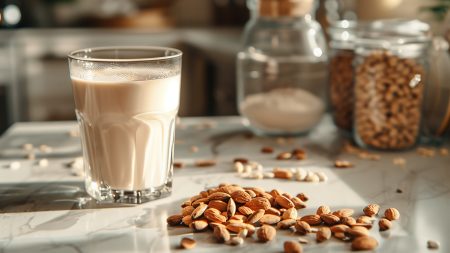
A Guide to Plant-Based Drinks
Plant-based drinks, which are an alternative to milk, are now available in almost every store. And the available offer is huge: coconut, almond, oat, soy, rice, cashew, hazelnut drinks… You can easily prepare oatmeal, millet porridge, pudding or a smoothie using these products. There are even special drinks that foam easily, so they can be used by baristas and white coffee lovers.
It is important to note that plant-based beverages made from different products differ not only in taste but also in nutritional value. Do you know what to look for when making a good purchase? I am sure this guide will make it much easier to choose what you need! 🙂
Label for a Good Start
When choosing a plant-based drink, start by analyzing the product label and its ingredients. Many manufacturers add sugar and other sweeteners, such as maltodextrin or fructose, to their products, which may negatively affect our health. Beverages with added sugar are of course more caloric, which is important if you are trying to lose weight.
Another aspect worth paying attention to are vegetable oils, stabilizers and emulsifiers added to drinks. Their task is to improve the consistency and taste of the drink, making it similar to cow’s milk, and also to extend the shelf life of the product. Their presence is often necessary. However, it is worth paying attention to the type and amount of these additives as some of them can affect health, especially when consumed regularly. If you prefer more natural products, look for plant-based drinks with a shorter and simpler composition, in which the amount of such additives is minimal.
Plant-based drinks have different nutritional values than cow’s milk. They usually contain less protein and calcium. This is one of the reasons why they are fortified with various vitamins (A, D, E, B vitamins) and ingredients such as calcium and zinc.
Fortification (enrichment with selected nutrients) is not mandatory, so when shopping you may come across products that are not characterized by high nutritional value. Consumed on a daily basis in large quantities, they can lead to the occurrence of certain deficiencies (e.g. calcium, vitamin B12). That is why it is so important for the diet to be as varied and balanced as possible. If plant drinks are a product that you consume regularly, always choose a fortified option.
Plant-Based Drinks Instead of Milk
A plant-based drink is not the same as cow’s milk. Although it can perform a similar function in the kitchen, it differs in terms of nutritional value. Therefore, it is worth making a conscious choice, paying attention to the pros and cons of each product.
The main advantages of plant-based drinks include the absence of lactose, which can cause digestive problems in many people, and the absence of allergenic cow’s milk proteins. This makes them a good option for people with lactose intolerance or milk allergy. Plant-based products are also an ideal choice for those of you who, for various reasons, avoid animal products and prefer a vegetarian or a vegan diet.
Another advantage is that, compared to milk, plant-based drinks usually contain less saturated fat, which should be limited in the diet, and they have more desirable unsaturated fatty acids instead.
Most plant-based drinks are also neutral in taste, which makes them versatile — great for both sweet and savory dishes.
However, everything has its drawbacks. Not every plant-based drink will be suitable for people with allergies (e.g. to nuts or soy). What’s more, most plant-based drinks contain less protein and calcium than cow’s milk, and not all of them are enriched with deficient ingredients. In addition, some drinks may have a peculiar flavor that does not go with every dish, and others may contain unhealthy additives, such as sugar or large amounts of salt.

My Favorite Plant-Based Drinks
Finally, I would like to tell you briefly about 3 plant-based drinks that I often use when cooking
Coconut Drink
It is irreplaceable for desserts, oatmeal, and millet porridge. It gives them a creamy texture and a delicate coconut flavor. It also works great in savory dishes, such as cream soups or in Asian cuisine. It is safe for people with allergies to cow’s milk proteins or to nuts.
Remember that coconut drink is not the same as coconut milk! Milk (usually available in a can or a small carton) is much more caloric (it contains significantly more fat).
Almond Drink
Its delicate, nutty flavor makes it a great choice for desserts, smoothies, and oatmeal. It is also a source of valuable unsaturated fatty acids. However, people with nut allergies should exercise caution.
Rice Drink
It is characterized by a relatively high carbohydrate content (among other plant drinks), which makes it a good choice for people who engage in intense physical activity. Rice drink has a natural, slightly sweet taste. Porridge based on this drink will be a concentrated source of energy for working muscles. Do not choose it if you have health problems connected with carbohydrate metabolism.
It is good to know that this product contains arsenic, so I recommend consuming it interchangeably with other plant drinks, so as not to cause arsenic to accumulate in the body. Consumed in moderate amounts, it will be safe.
The choice of a plant-based drink depends on your individual needs and taste preferences. Remember that each drink has its own unique properties. It is worth experimenting with different types to discover which ones best suit your expectations, both in terms of taste and nutritional value. Whether you are looking for an alternative to milk due to lactose intolerance, allergies, or simply a desire to add more variety to your diet, plant-based drinks can become a valuable ingredient of your meals 🙂
Bibliography:
- Antunes, I. C., Bexiga, R., Pinto, C., Roseiro, L. C., & Quaresma, M. A. G. (2022). Cow’s milk in human nutrition and the emergence of plant-based milk alternatives. Foods, 12(1), 99
- Fructuoso, I., Romão, B., Han, H., Raposo, A., Ariza-Montes, A., Araya-Castillo, L., & Zandonadi, R. P. (2021). An overview on nutritional aspects of plant-based beverages used as substitutes for cow’s milk. Nutrients, 13(8), 2650
- Walther, B., Guggisberg, D., Badertscher, R., Egger, L., Portmann, R., Dubois, S., Haldimann, M., Kopf-Bolanz, K., Rhyn, P., Zoller, O., Veraguth, R., & Rezzi, S. (2022). Comparison of nutritional composition between plant-based drinks and cow’s milk. Frontiers in Nutrition, 9, 988707










Comments No Comments
Join the discussion…